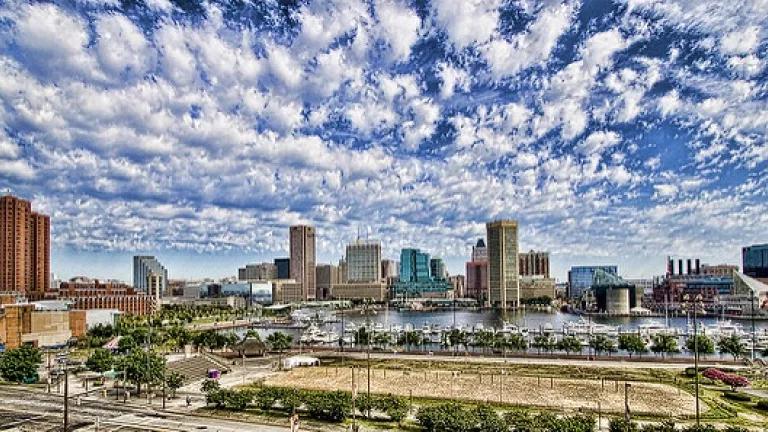Maryland on the Edge of EV Leadership

Maryland is on the verge of a new clean transportation milestone. But whether the state reaches it or falls short is now in the hands of the Maryland Public Service Commission (PSC). An ambitious proposal now before the PSC, backed by state legislators, local business associations, automakers, utilities, community-based organizations, environmental groups, and other stakeholders, would support investment in 24,000 electric vehicle (EV) charging stations to accelerate transportation electrification in the state. As the regulatory agency responsible for reviewing the proposal, the PSC has the opportunity to turn this plan into reality to the benefit of all Marylanders. Today, NRDC and other proposal Signatories jointly defended the substance of the proposals and reiterated the need for an efficient review process to the PSC via comments in the case docket.
The need to clean up Maryland’s transportation sector is underpinned by the state’s commitment to the Zero Emissions Vehicle (ZEV) program, a commitment shared by nine other states. The ZEV program requires Maryland to have roughly 300,000 EVs on the road by 2025. Under the Greenhouse Gas Emissions Reductions Act, which Governor Larry Hogan signed in 2016, the state must also reduce economy-wide emissions by 40 percent by 2030 from 2006 levels. Since then, Hogan has stepped up his climate leadership and joined the U.S. Climate Alliance: a bi-partisan initiative supported by 17 governors to meet the goals of the Paris Climate Accord. With the transportation sector contributing nearly half of the state’s emissions, any plan to meet state emission reduction goals must address transportation petroleum use.
But for Marylanders to make the switch to EVs, they need a place to charge their vehicles where they live, work, and play. Recent analysis by the National Renewable Energy Laboratory (NREL) demonstrates that many more chargers are needed as the EV market grows: NREL estimates more than 17,000 workplace chargers, 9,000 public chargers, and 1,000 Direct Current Fast Charging stations (think of stations needed for a quick charge on the highway or around town) are necessary to support the state’s goals. Currently, there are only 1,200 public chargers in use across Maryland. Many more will be needed to support charging at home. The network of charging stations envisioned in the proposals would make electric cars, buses, and other vehicles much more accessible for Marylanders wanting to “go electric.”
Over the course of last year, the PSC led an open, collaborative grid modernization process that invited input from diverse stakeholders on how electric utilities should engage in accelerating EV adoption. That process concluded with the submission of a $104 million package of utility transportation electrification proposals―which enjoy formal support from environmental organizations, community based organizations, EV charging service providers, and the utilities themselves. (Others, including General Motors and the Economic Alliance of Greater Baltimore, sent letters of support.) The proposals not only aim to deploy charging infrastructure in critical segments such as apartment buildings and workplaces, but also seek to educate utility customers on the value of EVs and begin to develop strategies to manage the impact of EVs on the electrical grid.
These proposals are the product of a year of thorough research, collaboration, and negotiation among stakeholders. While they will not completely close the infrastructure gap in Maryland, the proposals represent a singular opportunity to jump-start the state's burgeoning EV market, grow the competitive EV charging services market, and increase access to electric transport for all. If the proposal fails to advance, it would frustrate Governor Hogan’s climate policy goals, stymie the development of new technologies, and put mass-market EVs further out of reach for Maryland consumers.
The Public Service Commission now has the opportunity to unlock the EV market in Maryland. With an efficient review and approval of the proposals up for consideration, Maryland can create a clean transportation future that benefits all Marylanders.